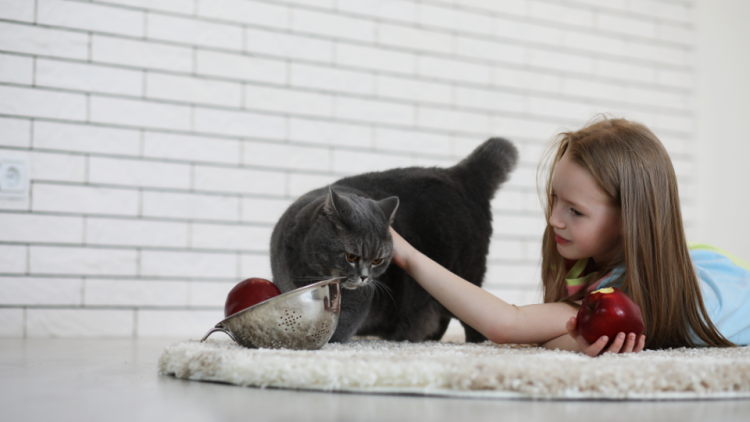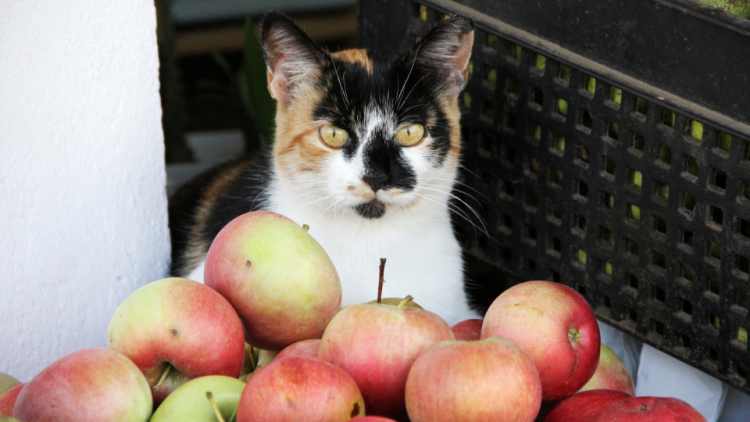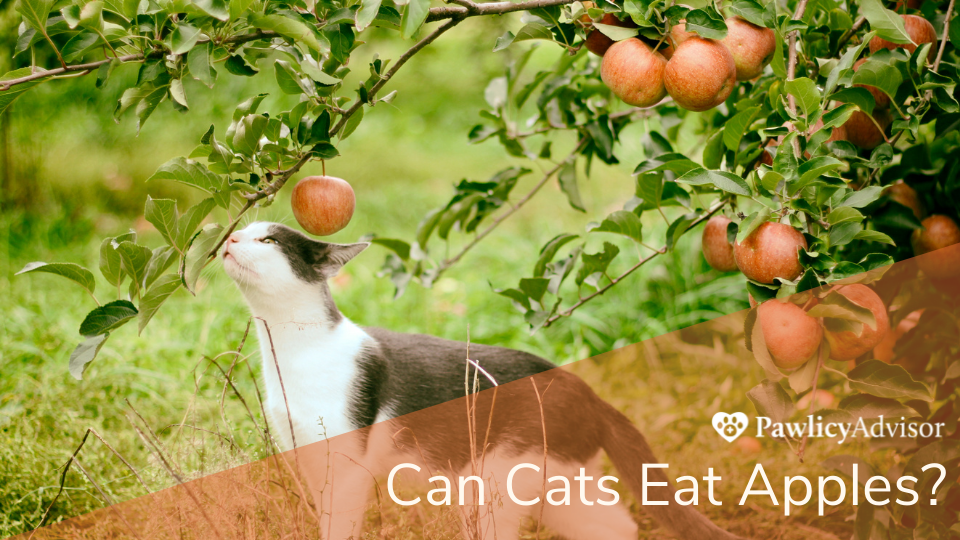Apples are healthy for humans and we already know that dogs can eat apple slices now and then, but can cats eat apples, too? We always want to ensure that we are giving our feline friends the healthiest and most nutritious foods, so are apples one of them?
In this post, we’re discussing whether apples are a healthy snack for your cat, and how to feed them safely since some parts can be toxic.
Table of Contents:
- Can cats eat apples?
- Risks with feeding cats apples
- Can kittens eat apples?
- How to feed cats apples
- Key Takeaways
Pro Tip: According to research, more than seven million cats and dogs have fallen ill after ingesting something toxic. Remember that having pet insurance is the best way to protect your pet against poison-related illnesses, without being a significant burden on your wallet.
Can cats eat apples?
Yes, apples are generally considered to be safe for feline consumption.
In addition to being a great source of minerals and vitamins (especially vitamin C, A, and K), apples are also rich in dietary fiber and antioxidants which can help lower cholesterol and inhibit the growth of cancer cells in humans. However, cat’s digestive systems differ from humans’, so their diet should also be different from ours.
Cats are obligate carnivores, meaning they rely on nutrients found in animal products. Therefore, the best way to meet their nutrient requirements is to provide them with specially formulated cat food. As long as your pet is getting all of their required nutrients from their regular diet, vegetables and fruits aren’t necessary.
In addition, not much is known about cats’ ability to digest and absorb the nutrients found in veggies and fruits like apples. Being carnivores, it is possible that their digestive system doesn’t allow cats to use the nutrition in apples as effectively as we might do.
The good news is, you probably won’t have to worry too much about your cat eating apples. Due to their carnivorous nature, felines lack taste receptors for sweetness, so they usually aren’t too excited by sweet treats of any kind, including apples. Still, if your kitty seems to enjoy the taste and they don’t suffer any side effects, eating apples in moderate amounts is unlikely to do any harm.
Risks with feeding cats apples
Although apples are generally considered safe for cats, there are certain things that pet parents should keep in mind:
Apple leaves, stems, and seeds contain cyanide and are poisonous to cats. Even though the levels of cyanide are quite low, it’s still best not to allow your cat to eat these parts of the fruit. Bear in mind that cats are much smaller than we are and it takes far less of a particular poison to harm a cat than to harm a human. If your kitty swallows apple seeds, leaves, or stems, call your vet or the ASPCA Animal Poison Control Center (888-426-4435) right away.
Pro Tip: Seeing your feline companion unwell is a pet owner’s worst nightmare. To be on the safe side, it’s always best to have a pet insurance plan in case of unexpected vet fees.
Apples shouldn’t be given to felines with obesity and diabetes, as they’re high in sugar. Furthermore, apples should be given with caution to cats with gastroenteritis and IBD, as these animals are more prone to suffering side effects from consuming apples. The high content of dietary fiber present in the fruit can be difficult for cats to digest, causing diarrhea, upset stomach, and excess gas.
Some cats might be sensitive to apples and develop diarrhea, vomiting, or other adverse symptoms.
Too much apple can upset your cat’s stomach. Apples should only be given occasionally and in moderate quantities. They are not a complete and balanced food, so they should only be given as a treat, i.e. they shouldn’t comprise more than 10% of your pet’s daily calorie intake.

Can kittens eat apples?
Kittens can eat apples, just as adult cats can, and applying the same basic precautions. It’s also important to keep a close eye on your kitten’s diet. Growing kittens need a specially formulated diet to ensure that they get all the nutrients they need.
So, while kittens can have small pieces of apple, you should be absolutely sure they’re eating a nutritious diet.
Can cats eat green apples?
Green apples such as Granny Smith are almost the same as any other kind of apples and only differ in a way that they’re firm in nature and more sourin taste. You can safely feed your cat slices of seedless green apple in moderate amounts and on occasion (once or twice a week).
Can cats eat cooked apples?
Yes. Cooked and uncooked apples are the same for cats, but cooking makes the apple softer and easier for your cat to chew and digest.
Make sure not to add anything when cooking the apples. We, humans, love adding cinnamon and sugar to enhance the apple’s taste, but too much spice or sugar can cause stomach upset in your kitty.
Can cats eat applesauce?
Store-bought applesauce can contain preservatives and chemicals that whole apples wouldn’t have. It can also have added sugars** and, considering the fact that apples already contain too much sugar, adding more into your cat’s diet is not such a good idea.
On the other hand, if you are preparing homemade applesauce, allowing your cat a lick or two will probably not do any harm, as pureed foods are easier for cats to digest.
Can cats eat apple pie?
It’s best not to give your cat apple pie. Baked apples shouldn’t cause any problem to your feline friend but other ingredients might. Apple pie may contain sugar, cinnamon or apple pie spice, butter, and lemon juice, all of which can make your cat’s stomach upset.
Can cats eat dried and candied apples?
Dried apples are a far worse food choice than regular apples. This is because when the water is extracted from the apple, almost all that is left is sugar that your cat doesn’t need. In other words, your pet would only need to consume a small amount of dried apple to get big amounts of sugar in their system.
Candied apples are also unsafe for cats. Candied fruit is made by cooking fresh fruit pieces in a sugar syrup until all the fruit's water content is replaced with sugar.
Can cats drink apple juice?
Yes, your cat can have a little bit of apple juice as long as it is homemade and 100% natural. The apple juice you buy in the supermarket contains added sugar, chemicals, and preservatives, all of which can hurt your kitty’s stomach.

Can cats eat apple peel?
Apple peel is thick and hard for cats to chew. If your cat has eaten a little bit of peel, there’s probably no room for concern, but too much peel can cause stomach upset. Although it is unlikely that your pet would want to eat apple peel, it’s best to stay on the safe side and safely discard it away from their reach.
How to feed apples to cats
If you’ve decided to feed your cat apples, here are some guidelines to follow in order to minimize the risks and keep your pet safe:
Be sure to wash the apple thoroughly. Some apples are treated with pesticides or sprayed with a raisin called shellac to make them look shiny. Better yet, peel the skin off to make the fruit easier for your cat to chew and digest.
Cut a portion of the apple into small bite-sized pieces that are easy for your cat to manage (approximately the size of their kibble) and remove the seeds, stem, and leaves.
As with all new foods, if you give a cat apple for the first time, be sure to offer a small amount (a spoonful of chopped pieces should suffice) and keep an eye for adverse reactions. Observe your pet for 24 to 48 hours to make they don’t suffer any adverse reactions such as vomiting or diarrhea. If they show signs of gastrointestinal upset, call your vet.
The best way to feed your cat apples is by hand-feeding them or stirring a little apple puree into their regular food. As mentioned before, make sure they don’t eat more than 10% of their calorie allowance from treats. This means that an average 10-pound feline should eat no more than a quarter of an apple or a tablespoon of apple puree per day.
Again, it’s best to give apples only on occasion in order to stop the high sugar content from having much effect on your pet’s health and weight. Once or twice a week should be enough, and in the limited portion sizes mentioned above.
Never give your cat rotten apples because they tend to be more sensitive to rotten fruit than humans. A rotten apple can cause diarrhea and other digestive issues, and fermented fruits can even result in an alcohol-fueled coma. In general, if you feed your kitty fruit, don't feed them anything you wouldn't eat yourself.
Consult your vet before giving your pet any new human foods, even if they are considered to be cat-safe.
Key Takeaways
- Cats can safely eat apples in small amounts and as an occasional sweet treat.
- Never give your feline friend apple seeds, leaves, or stems as these contain cyanide which is toxic to cats.
- If your cat is vomiting or experiencing diarrhea after eating apples or if they have ingested other parts of the fruit, call your vet right away.
